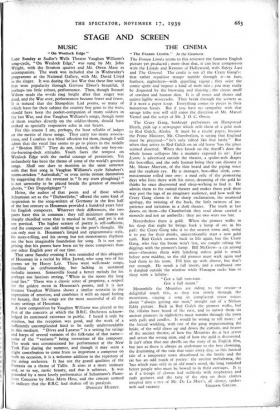STAGE AND SCREEN
MUSIC
On Wenlock Edge "
LAST Sunday at Sadler's Wells Theatre Vaughan Williams's song-cycle, " On Wenlock Edge," was sung by Mr. John Wright, with the Stratton quartet and Mr. Owen Mase as accompanists. The work was included also in Wednesday's programme at the National Gallery, with Mr. David Lloyd as the singer. It was during the last War that these fine songs first won popularity through Gervase Elwes's beautiful, if perhaps too little robust, performance. Then, though Steuart Wilson made the words ring bright after that singer was dead, and the War over, performances became fewer and fewer. It is natural that the Shropshire Lad poems, so many of which have for their subject the country boy gone to the wars, should have been the pocket-companion of many soldiers in the last War, and that Vaughan Williams's songs, though none of them touches directly on the soldier-theme, should have evoked as specially responsive echo in our hearts.
For this reason I am, perhaps, the least reliable of judges on the merits of these songs. They carry too many associa- tions, and I confess to a blind affection for them, though I will admit that the vocal line seems to go to pieces in the middle of " Bredon Hill." They do not, indeed, strike any boy-on- the-burning-deck attitudes. Youth faces the tempest on Wenlock Edge with the rueful courage of pessimism. Yet melancholy has been the theme of some of the world's greatest songs. Shall one dare to mention in the same sentence with that first song in Vaughan Williams's cycle Schubert's storm-stricken "Aufenthalt," or even invite instant damnation by suggesting that the revenant in " Is my team ploughing? " is not unworthy to be placed beside the greatest of musical ghosts, " Der Doppelgiinger "?
Heine, the author of that poem and of those which Schumann set as the "Dichterliebe," offered the same kind of inspiration to the song-writers of Germany in the first half of the last century as Housman provided a hundred years later for English composers. Whatever their differences, the two poets have this in common: they tell miniature dramas in sharply chiselled verse that is musical in itself, and yet is not too poetical. The higher ecstasy of poetry is self-sufficient, and the composer can add nothing to the poet's thought. He can only mar it. Housman's limpid and epigrammatic style, his story-telling, and his strong but not monotonous rhythms are the best imaginable foundation for song. It is not sur- prising that his poems have been set by more composers than any other English poet of our time.
That same Sunday evening I was reminded of this ubiquity of Housman in a recital by Miss Jarred, who sang two of his poems set by Henry Ley. These were well-made songs, excellent in craftsmanship, but lacking in sustained melodic interest. Somerville found a better melody for his perhaps too luscious setting, " White in the moon the long road lies." There was a classic sense of propriety, a respect for the golden mean in Housman's poems, and it is just because Vaughan Williams shows a similar restraint in the expression of emotion, and combines it with an equal feeling for beauty, that his songs are the most successful of all the many settings of Housman.
A new composition by Vaughan Williams was played at the
first of the concerts at which the B.B.C. Orchestra acknow- ledged its continued existence in public. I heard it only by wireless, but the reception was good, and the work of a sufficiently uncomplicated kind to be easily understandable in this medium. " Dives and Lazarus " is a setting for strings and harps of several variants of the folk-tune of that name— some of the " variants " being inventions of the composer. The work was commissioned for performance at the New York Fair during the summer, and though it may seem a slight contribution to come from so important a composer on such an occasion, it is a welcome addition to the repertory of the string orchestra. It has not the grand qualities of the Fantasia on a theme of Tallis. It aims at a more intimate and, so to say, rustic beauty, and that it achieves. It was preceded by a most lovely performance of Schumann's Piano- forte Concerto by Miss Myra Hess, and the concert seemed to indicate that the B.B.C. had shaken off its paralysis.
DYNELEY HUSSEY.




































































 Previous page
Previous page